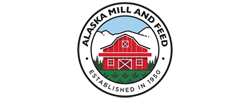The Definition of Well Balanced Dog Food | Alaska Mill & Feed
Posted by Kimberly McCourtney on Dec 4th 2020
Scientific research has shown which nutrients a dog needs to survive and thrive. A balanced dog food is one that provides all the necessary nutrients in the proper quantities and, just as importantly, in the proper ratios to each other.
A pet's nutritional health depends on receiving the correct amounts and proportions of nutrients from the six required groups:
- Water: All animals depend on water for life processes. Water is found inside and outside cells, and is involved in most biochemical reactions within the body.
- Protein: Made up of amino acids, protein serves numerous functions in the body, including muscle growth, tissue repair, enzymes, blood, immune functions, hormones, and energy.
- Fat: A concentrated form of energy, and can also be a source of essential fatty acids required by dogs for maintaining healthy skin and hair coat. Fat also serves as a carrier for fat soluble vitamins.
- Carbohydrates: These are sugars, starches and dietary fiber. Some can be readily burned as energy, while fiber has numerous effects in the gastrointestinal tract.
- Minerals: Inorganic elements with many functions, including bone and cartilage formation, enzymatic reactions, maintaining fluid balance, transportation of oxygen in the blood, normal muscle and nerve function, and the production of hormones.
- Vitamins: Vitamins work in concert with other vitamins and nutrients to nourish the animal in various ways. Different vitamins play roles in maintaining the health of different systems in your dog.
With the exception of water, commercial pet foods identified as 100% complete and balanced contain all of these required nutrients per life stage. These nutrients are also present in the proper proportions.
The other crucial measure of a dog food is energy, measured in calories. Energy in the form of calories provides the driving force in metabolic reactions and allows for the utilization of all other nutrients.
Depending on your dog’s age, breed size, environment and activity level, energy needs will vary. While you need to make sure you’re giving your dog enough calories, you also don’t want to give too many or your dog’s body will store the extra energy as fat, which can lead to obesity.

